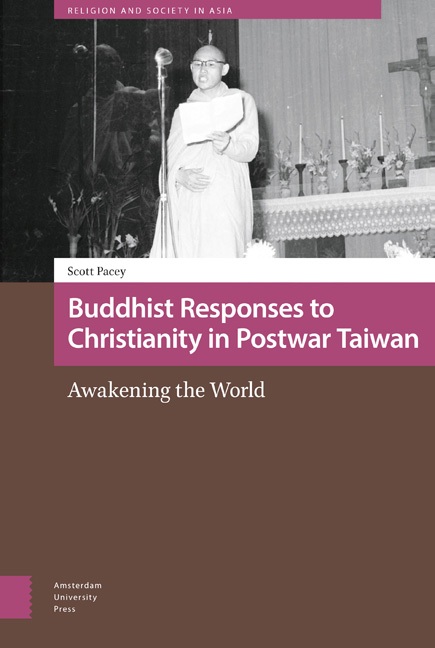Book contents
3 - Buddhism and Modernity
Published online by Cambridge University Press: 21 November 2020
Summary
Abstract
The academic research of the Catholic priest Du Erwei generated strong responses from Buddhists. Du claimed that Buddhism was descended from earlier lunar religion—and thus, implicitly, that it embodied a “primitive” stage of religious thought. As an anthropologist and scholar affiliated with National Taiwan University, Du drew from voluminous academic sources, meaning that his theory demanded a rigorous Buddhist response. This chapter discusses Yinshun's writings from the period, which aimed at showing how fundamental Buddhist beliefs transcended history and that Christianity itself was, as Du Erwei had claimed about Buddhism, historically-derived. Modern historiographical forms thus increasingly paralleled the appeal to values, showing their importance for identity formation and as a standard for religious “truth”.
Keywords: Du Erwei, lunar religion, Pure Land, Amitābha, Moses
The Buddha said to Ānanda, “You and others like you still listen to the Dharma with conditioned minds, and therefore you fail to understand its real nature. Consider this example: suppose someone is pointing to the moon to show it to another person. That other person, guided by the pointing finger, should now look at the moon. But if he looks instead at the finger, taking it to be the moon, not only does he fail to see the moon, but he is mistaken, too, about the finger.
The Buddha was born into a world replete with deific figures. Long before, Indo-Europeans had moved into northern India, beginning in 1500 BCE. By the time of the Buddha's appearance in the middle of the first millennium BCE, an extensive body of orally-transmitted texts, called the Vedas, had developed. These dealt with the relationship between human beings and a polytheistic cosmos. To this textual body was later added the Brāhmaṇas, the Āraṇyakas and the Upaniṣads. And thus, while early Indo-European belief centered on sacrifice, by the time the Buddha was born in the sixth century BCE, new religious developments had taken place. Among these was a belief in reincarnation—that after death, rather than head to the “World of the Fathers” or the “House of Clay,” the soul migrates into different bodies depending on one's conduct during life. Even deities were subject to death and rebirth. An ascetic preoccupation of the Buddha's time was how to bring cessation to this constant cycle of transmigration.
- Type
- Chapter
- Information
- Buddhist Responses to Christianity in Postwar TaiwanAwakening the World, pp. 121 - 148Publisher: Amsterdam University PressPrint publication year: 2019

